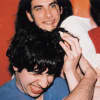 In the 2007 documentary Helvetica, Lars Müller, a publisher of design books, memorably said, “I think I’m right calling Helvetica the perfume of the city. It is just something we don’t notice usually but we would miss very much if it wouldn’t be there.” In many ways this metaphor could also extend to Philippe’s Zdar’s presence on the albums he’s produced and mixed: he may not define a record’s landscape, but he provides a distinct and legible essence to each project. Here are a few of our favorite Zdar cuts both as a producer and as a performer in Cassius. Read Amber Bravo's FADER #80 feature on Zdar here and check out our notes below.
In the 2007 documentary Helvetica, Lars Müller, a publisher of design books, memorably said, “I think I’m right calling Helvetica the perfume of the city. It is just something we don’t notice usually but we would miss very much if it wouldn’t be there.” In many ways this metaphor could also extend to Philippe’s Zdar’s presence on the albums he’s produced and mixed: he may not define a record’s landscape, but he provides a distinct and legible essence to each project. Here are a few of our favorite Zdar cuts both as a producer and as a performer in Cassius. Read Amber Bravo's FADER #80 feature on Zdar here and check out our notes below.
Phoenix, Wolfgang Amadeus Phoenix (Glassnote 2009)
When this album came out, Phoenix were already everywhere. I saw them perform in an Apple Store, at Music Hall of Williamsburg, and, later, at Madison Square Garden. It’s no secret that they’re a hugely popular band, but it was still surprising to see them connect emotionally with so many people. Maybe it was just that it felt like everyone let their guard down, and that was kind of weird because what Phoenix is great at is making expertly constructed pop songs that can exist in perfect harmony with car commercials. It’s not a bad thing, it’s just not what you expect to jangle the chimes of millions of jaded New York cool guys. But it did, and now here we are, living in a post-Wolfgang Amadeus Phoenix world, where being melancholy is somehow actually kinda slick. SHS
Cassius, “I <3 U So” The Rawkers EP (Ed Banger 2010)
Cassius’ “I <3 U So” floats a tweaked, squelching 1971 Sandra Richardson lyric away from its context, unabashedly repeating a vaguely familiar, vaguely menacing phrase—Ooh, I love you so/ But why I love you I’ll never know—over drum fills and what sounds like a balloon deflating. “I <3 U So” has a lift and some sparkle, but it’s much slower than Cassius’ best-known work. Wobbling on one foot like the group is trying to wrap their heads around dubstep, it’s neither appropriate for club dancing nor home listening, but maybe the dizzy walk in between. A testament to its open-ended power, Jay-Z and Kanye West used the song as the backing canvas for “Why I Love You,” the final track
on their grandstanding collaborative LP, Watch the Throne. NZ
The Rapture, In the Grace of Your Love (DFA/Modular 2011)
As the story goes, it was Pedro Winter (of the French label Ed Banger) who recommended Philippe Zdar as the go-to producer for The Rapture’s yet to be released (and then label-less) new record. And really, he was the perfect fit: Here’s a guy who grew up worshipping Detroit techno, who could understand the roots of The Rapture’s transformative, genre-straddling dance-punk but also relate to their technical and emotional maturity as a band. On ITGOYL, Zdar plays the consummate coach (and master in the control room), reminding each member of their strengths and their roots, all the while pushing the mixes to somewhat unexpected and uncomfortable places. The result is The Rapture going farther than they’ve ever gone, with Luke Jenner singing strong and bright like some gospel-fed saint, Vito Roccoforte playing beats you can sing and Gabriel Andruzzi adding free jazz embellishments that, in 2001, would’ve made him blush. AB
Kindness, World, You Need a Change of Mind (Polydor 2012)
There’s a bit of dialogue in Adam Bainbridge bka Kindness’ faux-behind-the-scenes music video for “Gee Up,” a song first released in 2009 and re-recorded for his 2012 album co-produced by Philippe Zdar, where one production assistant says to another, “I kind of like it. Lo-fi with hi-fi values.” “Would’ve been better two years ago,” the other replies. At times convincingly sassy and at others cheerlessly tongue-in-cheek, World has prompted some critics to deride it as too-late chillwave. But for the work of a suburban England native whose recording took him to Berlin, Philadelphia and Ibiza, then ultimately to Paris to work with his dream producer, Zdar, the album packs years worth of baggage, pressure-pressed into rich, dateless production that trend-concerned critics like that second assistant grossly underestimate. DC
Sébastien Tellier, “La Ritournelle” 12-inch (Lucky Number 2005)
Sébastien Tellier makes French disco, which adds him to a lineage of men with excellent handlebar mustaches and a penchant for big beats. Tellier’s music is never bad, though it’s almost always too knowingly bawdy for my tastes (one LP was entitled Sexuality and its cover art featured him on horseback galloping across an enormous breast; it was sold at American Apparel). But “La Ritournelle,” a seven-plus minute song he released in 2005 that I have listened to innumerable times, trades the machismo for something more elegant and longing, centered around piano and hearty drum work. There are vocals, but they only appear once, in the middle of the song, Tellier singing earnestly in heavily accented English, Love is to share, mine is for you. The song is an anomaly in his catalog, though, while completing this issue, thinking about the tenor of Philippe Zdar’s music, I had the realization that Zdar’s touch must be behind the song—a Google search showed he mixed it. It’s another tally in his long list of transformations, and another artist whose best moments may belong to someone else. MS
Cassius, “Cassius 1999” 1999 (Virgin 1999)
Though “Cassius 1999” isn’t the most iconic pillar of French Touch, the viral subgenre of heavily filtered-and-phased disco revival that crested at the turn of the millennium, with one foot in ’80s and the other in UK garage, the song is any DJ’s worthy segue into and out of the style. “Cassius 1999” was the first, and ultimately, most internationally chart-successful single the duo released on Virgin, home to like-spirited groups like Daft Punk, Air and the short-lived collaboration Stardust, whose “Music Sounds Better with You” works as its most natural, diva-sampling partner. Even if the song doesn’t first catch your eye as you gloss over the French Touch menu, order a round for the table: “1999” always opens up enriching pairings. DC


